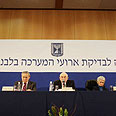
Winograd Commission presents report
צילום: גיל יוחנן
Winograd good for Hizbullah
War inquiry caused grave damage to Israel’s image in Arab world
A mighty struggle is taking place around us and will determine Israel’s fortunes in the Middle East no less than the IDF’s power, which will remain limited even after all the Winograd report’s conclusions are implemented. It is a bitter struggle between two camps in the Arab world: On one side is zealous Islam that preaches for endless resistance until we are removed from here, and on the other side we have compromise-seeking Islam, the kind that led Arab states in 2002 to draft a joint resolution about making peace with Israel based on terms that are mostly acceptable also to our good friends in the international community.
In that context, the painful process of examining the Lebanon war is essential, but the complete disregard to the inquiry’s effect on the fateful struggle around us is much more dangerous than any severe failure identified by the commission of inquiry.
Not much can be expected of political leaders who make statements regarding the war in the north. They indeed know that every word they utter is translated into Arabic and that any hint of war criticism will be received joyfully across the border. However, there is no way to avert the fierce political struggle which created a strange coalition between Zahava Gal-On on the left and Benjamin Netanyahu on the right. Both of them firmly argue that Israel lost the war, while using completely opposite arguments.
Yet the Winograd Commission members’ disregard for the controversy in the Arab world caused Israel great damage. The report had to take into account the fact that legitimate domestic criticism pertaining to the way the war was managed constitutes a dramatic boost to the Teheran-Beirut axis and provides Hizbullah with the ultimate proof for the success of its violent approach.
“Allah shall bless Winograd,” cheered Hizbullah’s news announcer following the Winograd press conference, which he said “humiliated moderate Arabs.” The public criticism here delivered a painful blow to the Muslims who in fact struggle against Nasrallah and seek a historical compromise that would enable us to coexist peacefully.
Winograd joyfully quoted in Teheran
Assuming that members of the Winograd Commission knew this in advance, they had to act accordingly. For example, during the press conference they could have conveyed a clear and incisive message to the hundreds of millions of Muslims who watched them live – words that are directed at the resistance camp that initiated the war, which as we know resulted in a grave disaster on the other side, much worse than the suffering of our northern residents.Winograd, who is being joyfully quoted in Teheran these days, should have uttered the simple truth: The other side would do well if it learns from us and launches an inquiry to examine the leadership that led to their disaster. Winograd should have made a point of reminding viewers that Nasrallah, had he faced an independent commission of inquiry, would have not lasted in his job even one day. Finally, Winograd should have noted that in a democracy, the leadership does not flood the streets with “divine victory” signs, as Nasrallah was forced to do through indirect Iranian funding.
Yet Justice Winograd remained true to protocol, and the result was much graver than the “missed opportunity” which he spoke of in relation to the war. The war’s objective, as we may recall, was to “etch the enemy’s consciousness” so it realizes that attacking Israel comes with a heavy price. Indeed, the grave damage we caused in Lebanon started to lead to this conclusion, and many in the Arab world condemned and disparaged Hizbullah’s actions.
Yet then came the interim Winograd report, and now the final report, and legitimate domestic criticism in Israel turned the tables. The Winograd Commission’s decision to turn a blind eye to developments in the region settled the controversy within the Arab world and led to a celebration of distorted interpretations and to a “sense of victory” being etched in the consciousness of belligerent Islam, on all this entails for the region’s future.










